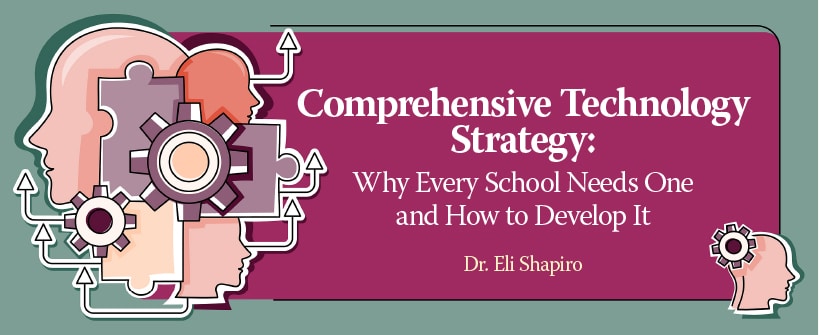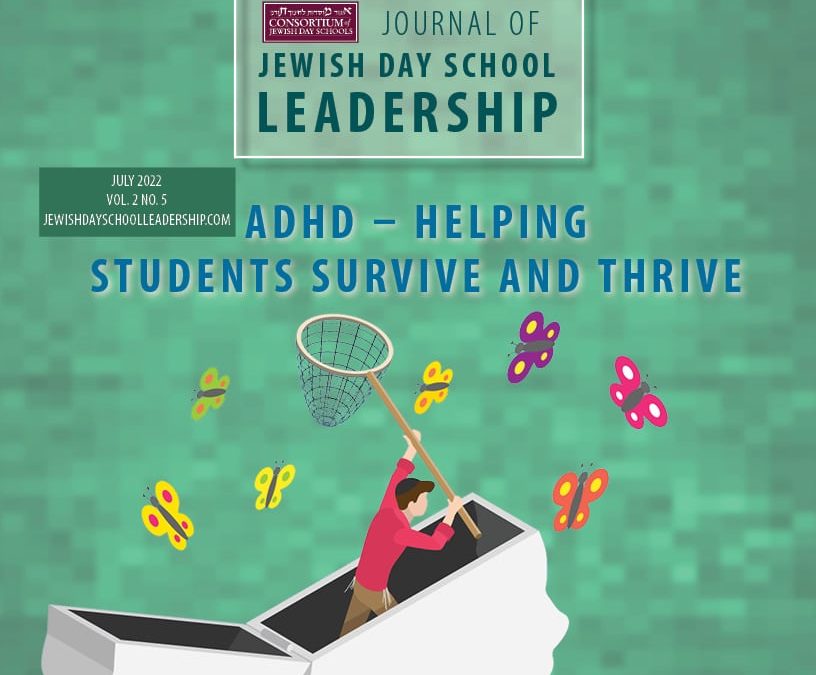
Finding Strengths in Every Student
July 18, 2022
Comprehensive Technology Strategy: Why Every School Needs One and How to Develop It
December 23, 2022ADHD is a different kind of topic for our journal. In the past, we’ve focused on things that may be on the minds of Jewish day school leaders, such as school culture, curriculum development, staffing, and assessments and data. ADHD seems like it may be more relevant to classroom teachers who are working with students with ADHD each day, and less relevant to those who find themselves in the admin wing.
In the course of preparing this edition, however, we have seen that this is not the case. First of all, many of the writers argue that the classroom strategies that help students with ADHD thrive are actually best practices for supporting all learners. As leaders guide schoolwide practice and culture, they must keep learners with ADHD, as well as all kinds of learners, in mind. Additionally, writers in this edition point out that any successful strategy to support students with learning disabilities must involve parents, and the parent-school relationship is certainly the business of school leadership.
We were surprised, but maybe shouldn’t have been, at how many school administrators reported having ADHD themselves. Some of them shared their stories with us in this edition and others just told us their stories off the record, but it’s reasonable to assume that most every school has professionals with ADHD working in it, not just students.
And there is the matter of going through life struggling with the ability to control attention. A couple of authors touch on the fact that ADHD is a challenge beyond the classroom, creating difficulty with tefillah in the areas of timeliness and kavanah, for example. For students who have a hard time in school due to ADHD, helping them thrive is not just about getting them through the school years, but setting them up for a life of fulfillment and meaning.
In this issue, Mrs. Miriam Gettinger touches on many of these topics, and interviews students and a teacher who have ADHD. Rabbi Yitzchok Menda addresses the parent who probably also has ADHD. Rabbi Gary Menchel and Dr. Karyn Feinberg describe a compassionate collaboration between parents, teachers, and students. And Mrs. Chana Luchins recommends using a wide lens – schoolwide approaches – and a narrow lens – classroom-based strategies to make your school an inclusive learning environment.
Rabbi Dov Gopin writes that instead of focusing on what the child with ADHD needs to do, let’s talk about what the teacher can do to make things work. Rabbi Shmuel Reich advocates for educating teachers and rebbeim about ADHD, since the more they know, the better outcomes we can expect. Dr. Malka Ungar shares with us that dialogic discussion – chavrusa learning – is an effective strategy that engages even challenging students. Etti Siegel provides a rundown of best practices and shared experiences when dealing with a student with ADHD.And Rabbi Dov Chastain recalls the songs that helped him learn as a child with ADHD and how he uses them now in his classroom and school.
Rav-Hazzan Scott Sokol, PhD’s contribution is about the role of attention in education, particularly Jewish education. Ms. Dina Schachtely and Mr. Clifford Brugman write how their school’s values of empathy and wonder help staff work with students who have ADHD. And Rabbi Dovber Chaiton describes how using the Responsive Classroom Approach and the Lehavin materials provides structure and resources for ADHD students.
Mrs. Miriam Gewirtz challenges us to the strengths of each child with ADHD by focusing on the mirror traits that accompany the troublesome symptoms of the disorder. Rabbi Avichai Pepper tells us to look for the root cause, since not every child who is hyperactive or inattentive has ADHD. And Mrs. Devora Malka Goldstein tells us about several example ADHD students who all have strengths that their teachers were able to find and tap into successfully.
Rav Reuven Leuchter has graciously been leading a series of webinars for mechanchim on the topic of teaching Emunah to students, particularly through the study of Chumash. It has been a privilege to host this series and to prepare and share an essay on this topic with our readers based on these webinars.
As always, we hope you find this edition to be informative, thought-provoking, and enjoyable to read. Feedback is always welcome – email [email protected].

